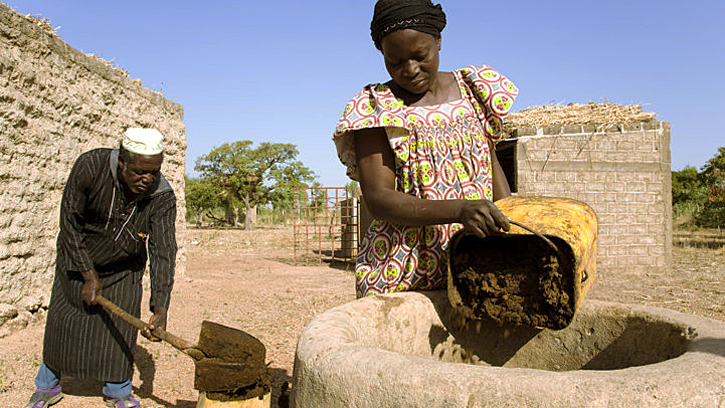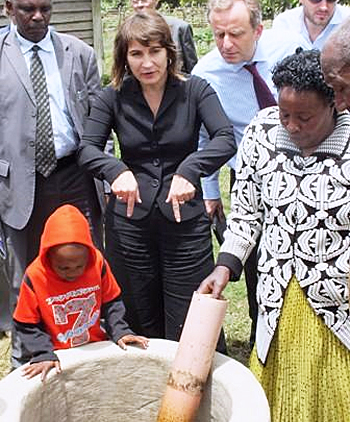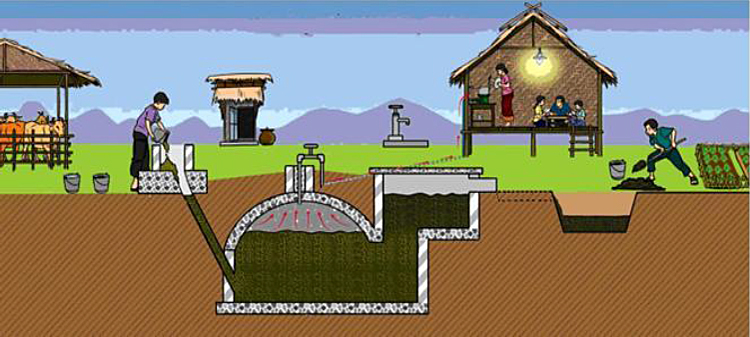Africa Biogas Partnership Programme announces construction 10.000th biogas digester in Kenya
 The Dutch Minister for Foreign Trade and Development Cooperation, Ms Lilianne Ploumen, visiting Kenya with a trade delegation, attended a ceremony in Kinale in Kiambu County on 30 October to celebrate the realisation of 10,000 biogas digesters throughout Kenya.
The Dutch Minister for Foreign Trade and Development Cooperation, Ms Lilianne Ploumen, visiting Kenya with a trade delegation, attended a ceremony in Kinale in Kiambu County on 30 October to celebrate the realisation of 10,000 biogas digesters throughout Kenya.
The biogas digesters have been constructed through the Africa Biogas Partnership Programme (ABPP), a partnership between Hivos and SNV. The programme supports national programmes on domestic biogas in five African countries; Ethiopia, Kenya, Tanzania, Uganda, and Burkina Faso.

Dutch minister Lilianne Ploumen visiting
the digester in Kinale, Kenya.
Combing aid and trade
According to Minister Ploumen, who toured the farm and saw for herself how biogas is produced and the benefits it brings the family, "This biogas programme is an excellent example of the latest vision on international cooperation, as it combines investment, trade and to a smaller extent grants, enabling improved standard of living for 175,000 people in Africa, including 50,000 Kenyans".
Partnering local enterprises
ABPP is very proud to be the first biogas programme that has been able to create sustainable results at scale by partnering with local enterprises, NGOs and governments in Sub-Saharan Africa and making this partnership a truly Dutch/ African partnership.
By the end of this year, more than 35,000 biogas digesters will have been constructed in the five ABPP countries, providing some 175,000 people with access to a clean, safe, sustainable and affordable source of energy.
In Kenya alone, 10,000 biogas digesters have been already constructed per end September 2013 and 50.000 Kenyans can already use its benefits to improve their lives.

Taboo human feaces
Connecting of latrines to the digesters also improves the sanitation and reduces communicable diseases. In most countries where ABPP operates, toilet connection is still emerging. In Ethiopia, around half of the digesters have latrines connected. In Uganda, this is around 10 percent.
Taboo associated with human feaces however, remains obstacle to connection of latrines to the biogas plants. "When people hear about human feaces, it’s like the worst thing that can ever cross their minds. Others don’t even want to hear about it however much you try to explain to them,", tells a biogas promoter.
Increased agricultural production
The social and economic benefits of domestic biogas for rural household are enormous and diverse. These benefits are to be found in improved health and sanitation, workload reduction, increased agricultural production, reduced use of non-renewable fuels and improved lightning situation. Application of bio-slurry (an organic fertilizer) in the agricultural fields has greatly improved soil fertility and has boost production thus reducing incidences of hunger and malnutrition as well as providing income streams for the households.
The ABPP hopes to extend the biogas programme as from 2014 to reach another 100,000 households by 2017 in the 5 ABPP-countries: Kenya, Ethiopia, Tanzania, Uganda and Burkina Faso.
This news item was originally published on the websites of SNV, Hivos and African Biogas Partnership Programme.
More information
Africa Biogas Partnership Programme
Nairobi, Kenya
+254 789 451729
http://africabiogas.org



